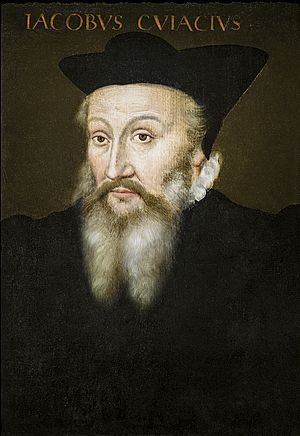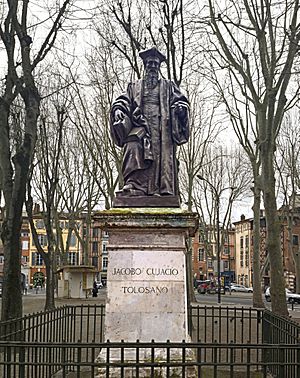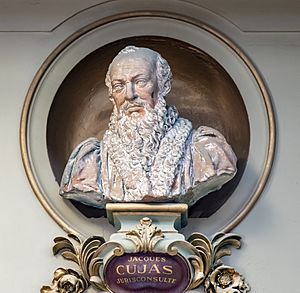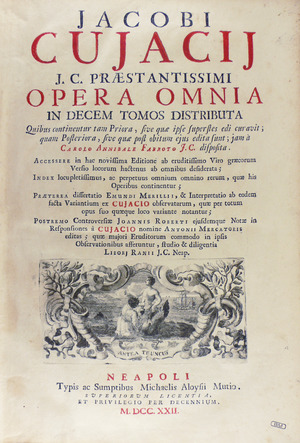Jacques Cujas facts for kids
Quick facts for kids
Jacques Cujas
|
|
|---|---|

Jacques de Cujas by an anonymous painter around 1580
|
|
| Born | 1522 |
| Died | October 4, 1590 (aged 67–68) |

Jacques Cujas (born in Toulouse, France, in 1522 – died in Bourges, France, on October 4, 1590) was a very important French expert in law. He was a leader among a group called legal humanists. This group wanted to study Roman law directly from its original texts. They believed it was better to understand the old laws as they were first written. They also wanted to know about the society and times when these laws were made.
Contents
The Life of Jacques Cujas
Early Life and Studies
Jacques Cujas was born in Toulouse, France. His father was a cloth maker. Jacques taught himself Latin and Greek. These were important languages for studying old texts. He then studied law under Arnaud du Ferrièr, a professor in Toulouse. Cujas quickly became known as a great teacher of the laws of Justinian. Justinian was a Roman Emperor who created a famous collection of laws.
Teaching Career and Challenges
In 1554, Cujas became a law professor in Cahors. About a year later, a famous French statesman, Michel de l'Hôpital, invited him to teach in Bourges. However, another professor there, François Douaren, caused trouble. He turned students against Cujas. So, Cujas left Bourges and accepted an invitation to teach at the University of Valence.
When Professor Douaren died in 1559, Cujas was asked to return to Bourges. He stayed there until 1567, then went back to Valence. At Valence, he became very famous across Europe. Students from many different countries came to learn from him. Two of his most famous students were Joseph Scaliger and Jacques Auguste de Thou.
Royal Recognition and Later Years
In 1573, King Charles IX of France made Cujas a special advisor to the parlement (a high court) in Grenoble. The next year, King Henry III gave him a pension, which was like a regular payment.
Margaret of Savoy convinced Cujas to move to Turin, Italy. But after only a few months in 1575, he returned to Bourges. The religious wars in France at the time made things difficult. The king called him to Paris, and he was allowed to teach civil law at the university there.
A year later, he finally settled back in Bourges. He stayed there until he died in 1590. Even though pope Gregory XIII offered him a lot of money in 1584 to move to Bologna, Italy, Cujas chose to stay in Bourges.
Cujas's Important Works
Focus on Original Roman Law
Jacques Cujas spent his life as a scholar and teacher. He did not get involved in the religious wars of his time. When people talked about these wars, he would often say, Nihil hoc ad edictum praetoris. This means, "This has nothing to do with the praetor's edict." A praetor was a Roman official who made laws. This showed that Cujas preferred to focus on his legal studies.
Cujas was an amazing legal expert because he looked past the old, often incorrect, writings about Roman law. Instead, he went straight to the original Roman law texts themselves. He collected more than 500 old handwritten copies of legal documents for his own library. Sadly, he asked for his library to be split up after his death. Because of this, many of his valuable old texts were lost.
Contributions to Legal Texts
Cujas made many corrections and improvements to old texts. He published these under the title Observationes et emendationes, which means "Observations and Corrections." These corrections were not just for law books. They also included many old Latin and Greek books by famous writers.
He didn't just study the laws of Justinian. He also found and shared parts of the Theodosian Code, another important collection of Roman laws. He also got hold of the original handwritten copy of the Basilika, which was a collection of Byzantine laws.
Cujas also wrote explanations for the Consuetudines Feudorum (laws about feudal land ownership) and parts of the Decretals (church laws). In his Paratitla, which were summaries of the Digest and the Code of Justinian, he wrote down the basic rules of law in short, clear sentences. These definitions were known for being very precise and easy to understand.
Cujas's Personality
Cujas's lessons were like continuous talks. He never dictated notes for students to copy. He prepared for his lessons by thinking deeply about the topics. He did not like being interrupted. If there was any noise, he would immediately stop teaching and leave.
He cared a lot about his students. Joseph Justus Scaliger, one of his famous students, said that Cujas lost a lot of money by lending it to students who needed help.
See also
 In Spanish: Jacques Cujas para niños
In Spanish: Jacques Cujas para niños
- Cujas Library
 | Sharif Bey |
 | Hale Woodruff |
 | Richmond Barthé |
 | Purvis Young |



